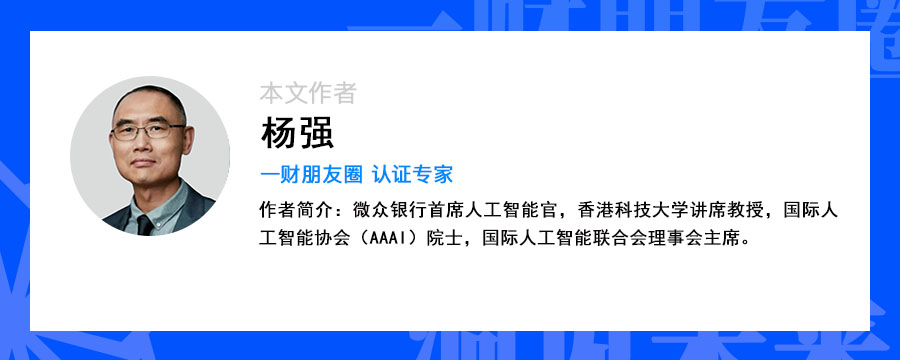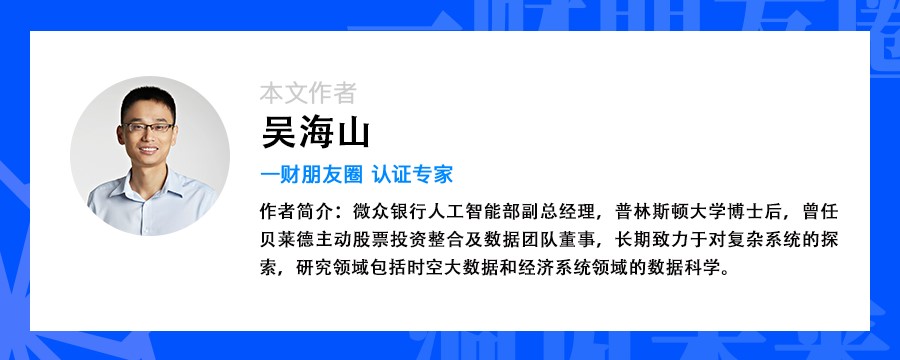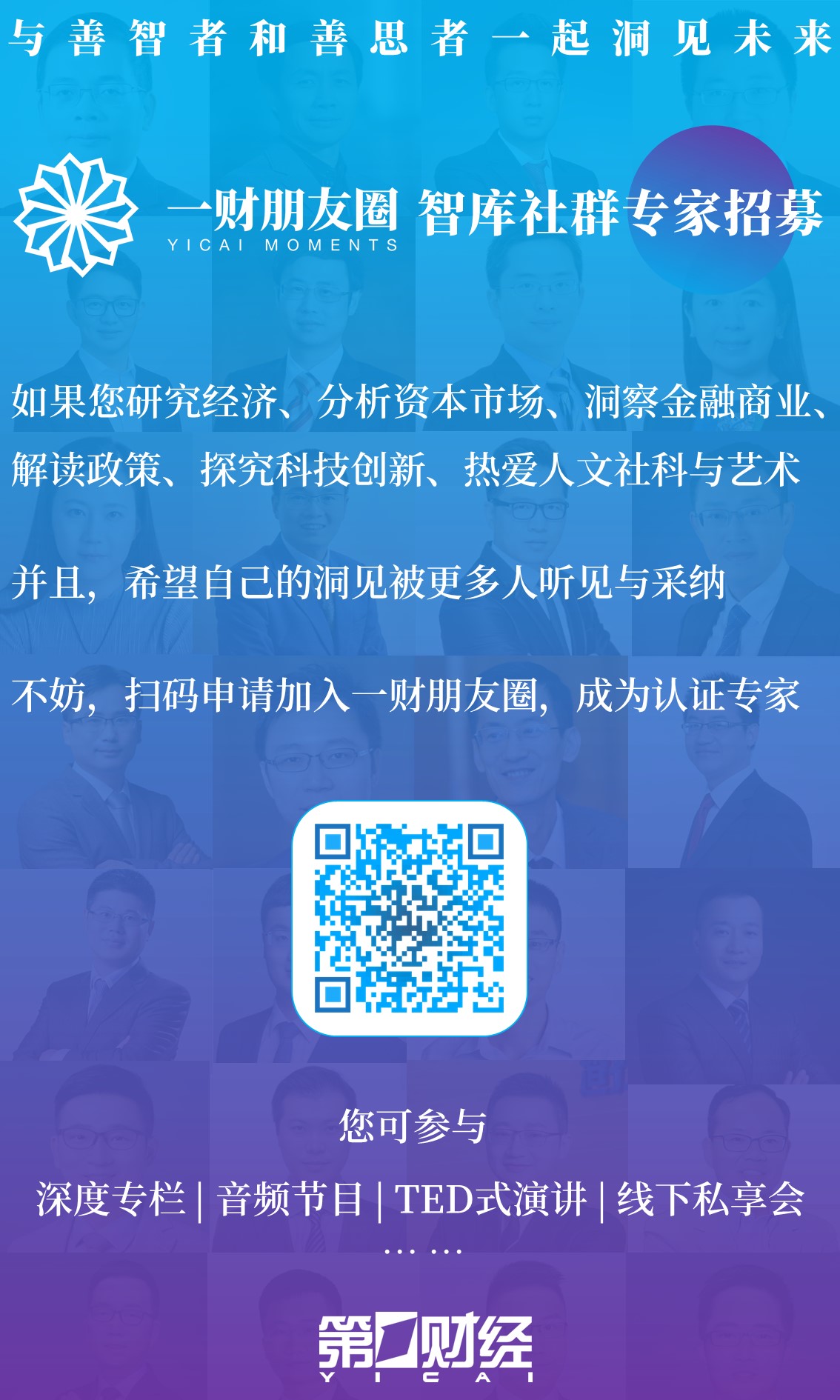A Cai Moments · Yang Qiang, Wu Haishan | Is artificial intelligence ushering in the best era?

Artificial intelligence (AI) has been developed for more than 60 years since its birth. In recent years, AI has become a hot spot in academia and industry around the world. Start-up companies are surging, huge investments are emerging, tech giants are constantly up the ante, and scientific research, capital and talent are moving closer to AI. So, some people will inevitably ask, have we ushered in the best era of artificial intelligence?
The Challenge of Good Times
Looking back today, 2017 may be an important node in the development of artificial intelligence in China. In 2017, "artificial intelligence" was written into the government work report of the National People’s Congress for the first time. Premier Li Keqiang said that it is necessary to fully implement the development plan for strategic emerging industries and accelerate the research and development and transformation of new materials, artificial intelligence, integrated circuits, biopharmaceuticals, and fifth-generation mobile communications. Artificial intelligence has also been hotly discussed by deputies to the National People’s Congress and members of the National Committee of the Chinese People’s Political Consultative Conference.
At the same time, at the 2017 Wuzhen Go Summit, AlphaGo defeated the world’s No. 1 Go champion Ke Jie with a total score of 3:0, which attracted the attention of the whole people. "Whether artificial intelligence has completely surpassed human beings", "Will artificial intelligence replace human beings" and other issues have also become hot topics.
It was also from that year that artificial intelligence was surging. Overnight, it seemed that all companies had become artificial intelligence companies. Capital and talent quickly poured into the field of artificial intelligence. "Artificial intelligence" became one of the hottest and most sought-after words in the technology, academic and corporate circles. Major Internet companies have vigorously promoted artificial intelligence research and development. Tencent founder Pony Ma has also publicly stated that if he can only invest in one field, starting from his own industry, he is most concerned about the AI industry related to information technology. Internationally, tech giants such as Google and IBM have been researching artificial intelligence for more than a decade, and some research results have entered commercial applications in recent years.
From these perspectives, artificial intelligence can be said to have ushered in a very good era, but there are also problems behind the excitement. For example, this boom is more driven by the industry and investment community, while the academic and basic research fields have not revolutionized, and the talent gap has not been really solved.
At the same time, AI still faces many challenges in practical application and implementation, especially data issues. The various types of data required for AI research are scattered in different enterprises, and the ideal "big data" that people often say does not exist, but the actual situation is that there are a large number of "small data" and "data islands"; in addition, data security, privacy, compliance and other issues have always existed. In 2018, the European Union officially implemented the strictest data protection regulation in history – the General Data Protection Regulation (GDPR), and on January 21, 2019, Google became the first US technology company to be heavily punished under this law, fined 50 million euros… These problems make the implementation and development of AI look less good.
Deeply empowering industry
In 2019, Premier Li Keqiang talked about artificial intelligence for the third time in the government work report. It is worth noting that this year, the Premier specifically proposed in the report to build an industrial Internet platform, expand "intelligent +", and empower the transformation and upgrading of the manufacturing industry.
At present, the innovative achievements of artificial intelligence have been applied in various fields, promoting technological progress, efficiency improvement and business model change in all walks of life. Among them, the financial industry is one of the most promising AI application fields, and AI + finance is the top priority of "intelligence +".
On the one hand, the information construction of the financial industry started earlier, and the industry attaches great importance to the standardization and standardization of data collection, so it has a large amount of accumulated data, which provides a solid foundation for the application of artificial intelligence; on the other hand, taking banks, insurance, securities companies as an example, the main business of the financial industry is based on large-scale data development, a large number of cumbersome data processing work, the urgent need for automation and intelligent change to liberate manpower; in addition, financial inclusion and scene-based innovation, also need new technical means to provide support, and the combination of artificial intelligence and finance undoubtedly provides more possibilities for financial innovation.
The author takes the practice of WeBank in the field of AI + finance as an example to introduce. Starting from demand, returning to business value is the core of self-researching AI. WeBank is an Internet bank serving small and micro enterprises and the general public. The most difficult part is the high service cost caused by the large number of scattered and large, lack of collateral, and imperfect guarantee system.
Therefore, the AI team of WeBank applies "AI + service" to actual business links. For example, three application systems are created based on the three major engines of "natural language processing engine", "voice engine" and "vision engine" – "intelligent nuclear system", "intelligent customer service system" and "intelligent quality inspection system", covering the whole process of business consultation, identity verification, data review, operation and lending. At present, through this set of AI robot combination boxing, we allow customers to complete all the online from consultation to application to borrowing, without offline account opening or paper materials, to maximize the solution to the problem of difficult and slow loan processes for small and micro enterprises, and to help enterprises innovate and develop.
The launch of the new national asset management regulations and the inclusion of the Chinese market in the MSCI index have had a profound impact on China’s asset management industry. WeBank is also making efforts in the field of "AI + asset management". It is currently developing alternative data based on satellite remote sensing image data, drone image data, mobile location data and public opinion text information. It can create an AI-driven asset management platform through artificial intelligence technology, which can not only monitor the macro economy in real time, but also predict the trends of listed and bond-issuing companies and different industries. Build an AI + Alternative Data-driven ESG (environmental, social and corporate governance) index, so as to provide investment decisions for asset management companies, fund companies, rating companies and other fields.
In the face of data silos and privacy concerns, where does AI go?
As mentioned above, the complexity, isolation, privacy and security of data are the key factors that plague and restrict the deepening development and application of AI, including the financial industry. How to solve these data problems, break down data silos, and establish true "big data" while better protecting data privacy and security has become a problem that must be solved in the current development of AI.
The author believes that in the face of these problems, we can have a new way of thinking – federated learning (Federated Learning), whose purpose is to protect user privacy and data security. Federated learning, as the name suggests, is to build a virtual "federal state" to unite large and small "data islands". They are like a state in this "federal state", which not only maintains a certain degree of independence (such as trade secrets, user privacy), but also can jointly model and improve the effect of AI models without sharing data.
Essentially, it is a distributed encryption machine learning technology where all parties involved can build models without disclosing the underlying data. This is also a win-win machine learning method. It breaks down the data dimension walls on the top of the mountain, revitalizes large and small "data islands", and connects into a win-win AI continent.
In the field of finance, federated learning can be used to analyze potential fraud; in the field of insurance pricing, it can accurately analyze the attributes of users in more dimensions. For enterprises, the application of federated learning can save costs more effectively, and it can also make user classification more accurate. In addition, for some very sensitive data scenarios, such as the medical field, different hospitals can also share sensitive medical data through federated learning technology.
The future AI new generation of machine learning algorithm framework should be based on privacy protection, security compliance, reasonable interpretation, and transparent reasoning mechanism to ensure the healthy development of artificial intelligence. The development and practice of federated learning provides new ideas for the industry. Of course, the construction of AI ecology and the construction of big data also requires different enterprises, scholars, and research institutions to join forces, share technology, share data, and unite forces to jointly solve data silos and user privacy issues.
AIFuture: Basic research still requires continued efforts
So, what is the current development of AI in China, and what are the future prospects? Ma Songde, former vice minister of the Ministry of Science and Technology, and many other experts and scholars have said that China’s application of AI will be the largest in the world, and the prospects are very good, but continued efforts are needed in basic research.
The author believes that in recent years, China’s AI map has been "dots" one by one, but it has not been able to form a "face". In other words, a deep AI application ecosystem that can open up the industrial chain has not been established, and there is still a lack of system level and infrastructure building.
At present, the industry’s understanding and application of AI is more limited to the single-function product level. For example, an enterprise introduces AI assistance in certain process links, such as human-machine interaction and facial recognition, but such an enterprise cannot be said to be an artificial intelligence enterprise. The entire industry should have a deeper understanding of AI, so that AI can drive the optimization of the core decision-making system of the industry, and maximize the advantages and revolutionaries of AI.
It is hoped that in the future, China’s AI colleagues will pay more attention to basic research and work together to truly drive the development and implementation of core, in-depth, and industrialized AI.


